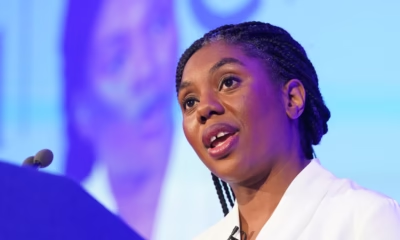NEWS
UK to Pay Extra £44.5m For Calais Security In Anglo-French Deal

Britain will pay £44.5m for extra security measures in France to prevent another refugee camp forming in Calais or any other Channel port, Theresa May is to announce.
The extra cash will go towards fencing, CCTV and other detection technology in Calais and other ports, possibly including Dunkirk. It will also be used to help relocate migrants from the port towns to other parts of France.
To be announced as part of the Anglo-French summit at Sandhurst military academy on Thursday, the money brings total British funding for security and policing in Calais since the “Jungle” camp was bulldozed in 2016 to more than £150m. The measures have included building a 1km-long concrete wall designed to prevent migrants and refugees getting close to the roads used by trucks approaching the port.
As well as pressing for an increased contribution to such costs, the French government has been urging the UK to set up a joint operation to process asylum seeker claims in Calais.
The proposal could form part of a new treaty – effectively an updated Le Touquet agreement, under which British border checks are carried out in France. There are around 1,000 refugees in Calais, including at least 70 unaccompanied children, and a joint processing system could provide a legal route to Britain for some of them.
A government spokesperson said: “This is about investing in and enhancing the security of the UK border. Just as we invest in our borders around the rest of the UK, it is only right that we constantly monitor whether there is more we can be doing at the UK border controls in France and Belgium to ensure they are as secure as possible.”
The announcement will form part of a package of measures to be announced by May and Emmanuel Macron to reinforce the close relationship the countries will continue to have after Brexit.
The pair will have lunch together, before travelling to Sandhurst, where the French president will be greeted with a guard of honour. They will hold a bilateral meeting, then attend an evening reception at the Victoria and Albert Museum.
May said the summit would “underline that we remain committed to defending our people and upholding our values as liberal democracies in the face of any threat, whether at home or abroad”.
Macron had been seeking an overhaul of the Touquet accord, saying France could no longer be Britain’s “coastguard” without concessions from the UK to help ease the migration crisis
Under the new, legally binding treaty, Britain will agree to accelerate procedures for accepting legitimate asylum seekers currently blocked in Calais, including unaccompanied children and those seeking to join their families in the UK, and will pay more for transport, security and border maintanence in the port.
“We have to send the signal that the border [at Calais] is not open or porous,” the Elysée said, echoing Macron’s message during a trip to the Channel port on Tuesday.
Officials said France was anxious not to prejudice Brexit negotiations on any future relationship between the UK and the EU, but was determined that Anglo-French ties “must not be weakened”.
The pair are expected to issue a 15-page communique, setting out plans for enhanced cooperation on defence, intelligence and “shared futures”, the latter including cultural projects, such as the loan of the Bayeux tapestry to the UK, and boosting French teaching in British schools.
As examples of military cooperation, the British government signalled that it would send three Chinook transport helicopters to Mali to provide logistical backing for French counter-terrorism operations there; while France agreed to contribute to the Nato-led forward presence in Estonia, where British troops are already based.
The UK will also allocate £50m of extra aid, including humanitarian support, to African countries, including Mali, Niger, Chad, North Cameroon, Burkina Faso and Mauritania, as part of what the government said was a joint effort to tackle issues in source countries and routes for migrants to Europe.







